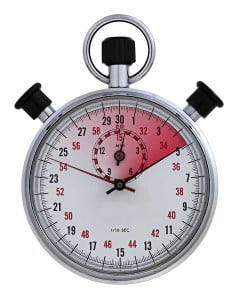
How long does it take to say “Thanks….” – to express your appreciation, regard, recognition, and encouragement to a team member for something they’ve done?
What the person has done doesn’t have to be a huge thing. In fact, it could be one of those tiny, everyday occurrences that may seem relatively insignificant yet made a difference to how the day, or even the past hour, went. For you, for the team, for your customers.
I bet you can do it in under five seconds flat.
Showing Appreciation
 Try it – take 5 and express how you value someone’s contribution, their expression of your core values, and your appreciation of their intrinsic motivations.
Try it – take 5 and express how you value someone’s contribution, their expression of your core values, and your appreciation of their intrinsic motivations.
Any channel will do. If you want to be daring, do it within earshot/eyesight of others on your team. Mind you, this is not to be some forced pollyanna praise and stroke bullshit, but genuine stuff, with concrete and recent examples. Be direct. Be specific. Be sincere. Go ahead, try it now. (I can wait :P)
Toolbox for Social Sharing
When we were all in the same physical location it was easy to give shout-outs to celebrate an accomplishment or ring a physical bell or gong that resonates across the entire office when a team has shipped something.
But how does a distributed team keep that same sense of connection and celebration? While a monthly all-hands meeting is one possibility, the mentions of accomplishments are all too fleeting.
All of the following have feeds and/or a slack integration that allows you to share your props with your team/company:
- kudobox.co “An easy way to share your thanks”
- TinyPulse “Cheers for Peers”
- bonus.ly “Workplace Happiness”
- propsboard.com “Team recognition for the 21st century” ( 🙁 no longer available. Was a nice idea…)
- Kudo Cards “Make a positive change movement”
- Reflektive “Real time feedback”
- 7Geese Recognition “7Geese helps companies elevate performance by combining OKR goal tracking with peer feedback, 1-on-1 coaching, recognition and modern performance reviews.”
- Assembly “A recognition and rewards platform that helps you scale your company culture”
And if you are feeling old school:
- Mail ’em a Post-it® note for them to stick on their monitor
Go Ahead, Make a Difference
 This idea is not “something new.” In fact, it’s as old as our brain chemistry – a good 50,000 years or more. I first heard of “Take 5” via Disney and their approach to “Creating Magic” and then again via Jurgen Appelo’s Management 3.0’s #workouts.
This idea is not “something new.” In fact, it’s as old as our brain chemistry – a good 50,000 years or more. I first heard of “Take 5” via Disney and their approach to “Creating Magic” and then again via Jurgen Appelo’s Management 3.0’s #workouts.
It is based on the belief that we all do our best – and even strive to do better – if we regularly have the experience that what we do matters, that it is valuable, and that our presence makes a difference to others.
I have personally observed that these types of rewards are, as Jurgen writes in Managing for Happiness, “more effective, more sustainable, and usually cost less money” than extrinsic motivations, like promised year-end bonuses. Recognizing individual contributions to team goals makes everyone – the recipient, the giver, and those observing – feel great.
Props/kudo’s/take 5’s work towards creating an atmosphere, a system, where people will enjoy their work, be highly engaged and motivated, and yes, improve their performance.
For the teams I work with it’s not the “redemption of bonus points” that drive us forward, but more the compliment, the fact that we know that someone noticed our individual contribution and took the time to say “thanks.” These interactions build team cohesion, rapport, trust, and safety. All necessary conditions for high-performance teamwork.
What do you do to say thanks?
Try this: give kudos at your next daily stand up, at the next iteration review, or at the next retrospective
What’s Your and Your Teammates’ Language of Appreciation?
There is a wonderful tool to help teams “hit the mark” for the folks they want to encourage via appreciation. (I learned the hard way that while Calvin did like words of affirmation, he preferred to hear them 1:1, and not at the all-hands meeting. Sorry about that bud!)
The Motivating By Appreciation (MBA) Inventory assists supervisors, managers, and coworkers to be able to communicate appreciation to their colleagues in ways that are meaningful for each individual’s personal preferences as, shocker, it turns out we might have different preferences…


